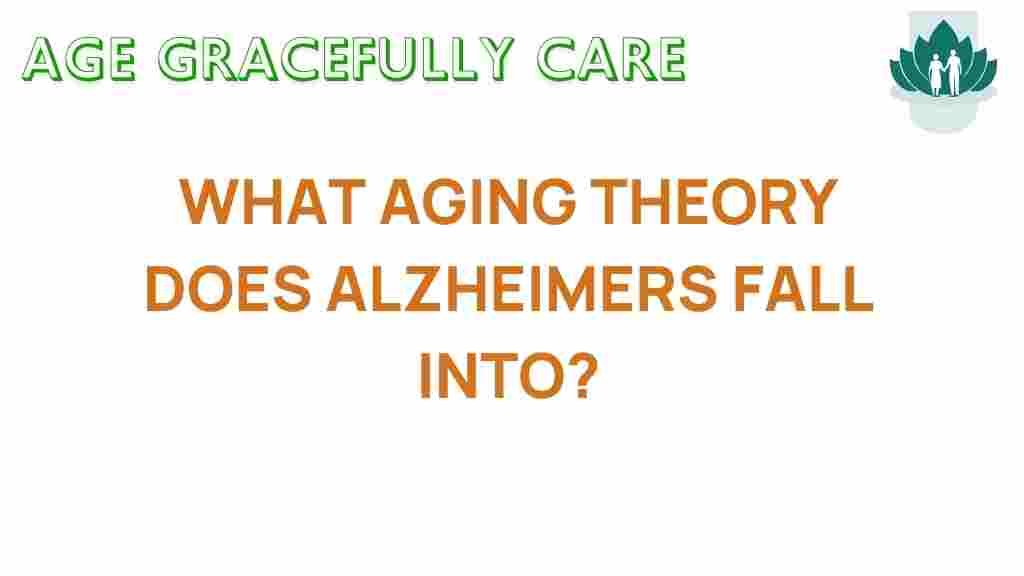Unraveling Aging: What Theories Illuminate Alzheimer’s Disease?
Aging is a natural process that affects all living organisms, and it is accompanied by various changes in physiology and cognitive function. Among these changes, Alzheimer’s disease stands out as a significant concern due to its profound impact on brain health and cognitive decline in the elderly. With the global population aging rapidly, understanding the relationship between aging theories and Alzheimer’s disease has become a focal point in health research. This article delves into the theories of aging, their implications for Alzheimer’s disease, and how they inform our understanding of dementia and cognitive decline.
The Theories of Aging
Aging theories attempt to explain the biological processes that lead to aging. These theories can be broadly categorized into two groups: programmed theories and damage theories.
Programmed Theories
Programmed theories suggest that aging follows a biological timetable, possibly regulated by genes. Key aspects include:
- Genetic Control Theory: Proposes that certain genes are responsible for the aging process.
- Telomere Shortening: The telomeres, protective caps on the ends of chromosomes, shorten with each cell division, leading to cellular aging.
- Hormonal Changes: Changes in hormone levels affect the aging process and can influence conditions such as Alzheimer’s disease.
Damage Theories
Damage theories focus on the accumulation of damage over time. Key theories include:
- Free Radical Theory: Suggests that free radicals cause cellular damage, contributing to aging and neurodegenerative diseases.
- Wear and Tear Theory: Proposes that accumulated damage from environmental stressors leads to aging.
- Inflammation Theory: Chronic inflammation may accelerate the aging process and contribute to conditions like Alzheimer’s disease.
Alzheimer’s Disease and Cognitive Decline
Alzheimer’s disease is the most common form of dementia, affecting millions worldwide. It is characterized by progressive cognitive decline, memory loss, and changes in behavior. Understanding the neurobiology of Alzheimer’s disease is crucial in finding effective treatments and interventions.
Neurobiology of Alzheimer’s Disease
The neurobiology of Alzheimer’s disease involves complex changes in the brain, including:
- Amyloid Plaques: Abnormal clumps of protein that accumulate between neurons and disrupt communication.
- Tau Tangles: Twisted fibers that form inside brain cells, leading to cell death.
- Neuroinflammation: Inflammation in the brain that can exacerbate neuronal damage.
These pathological changes lead to significant cognitive decline, impacting memory, reasoning, and the ability to perform daily activities.
The Intersection of Aging Theories and Alzheimer’s Disease
Understanding the relationship between aging theories and Alzheimer’s disease is vital. Several key points illustrate this intersection:
Genetics and Alzheimer’s Disease
Research indicates that genetics play a role in the risk of developing Alzheimer’s disease. For instance, mutations in the APP, PSEN1, and PSEN2 genes are linked to early-onset Alzheimer’s. In contrast, the APOE ε4 allele is associated with late-onset Alzheimer’s. These genetic factors align with the genetic control aspect of programmed theories, suggesting that certain individuals may be predisposed to cognitive decline as they age.
Oxidative Stress and Neurodegeneration
The free radical theory highlights oxidative stress as a contributor to aging and neurodegeneration. Elevated levels of oxidative stress have been observed in Alzheimer’s patients, leading to neuronal damage. This connection emphasizes the importance of brain health in the aging process.
Inflammation and Aging
The inflammation theory of aging underscores how chronic inflammation can contribute to cognitive decline. Alzheimer’s disease is characterized by neuroinflammation, which may exacerbate the progression of dementia. Addressing inflammation could be a potential therapeutic target.
Step-by-Step Process for Understanding Alzheimer’s Disease
To better understand Alzheimer’s disease and its link to aging, consider the following steps:
1. Educate Yourself on Aging Theories
Understanding different aging theories provides a foundational knowledge of the biological processes that may influence Alzheimer’s disease. Resources such as academic journals, books, and reputable health websites can offer valuable insights.
2. Stay Informed on Health Research
Keep up with the latest health research related to aging and Alzheimer’s disease. Following institutions like the Alzheimer’s Association can provide access to cutting-edge studies and findings.
3. Monitor Brain Health
Engage in activities that promote brain health, such as:
- Regular physical exercise
- Mental exercises (puzzles, reading, learning new skills)
- Social interactions to reduce isolation
- Eating a balanced diet rich in antioxidants and omega-3 fatty acids
4. Promote Healthy Aging
Adopt lifestyle changes that can positively impact the aging process, including:
- Maintaining a healthy weight
- Managing chronic diseases
- Getting regular health check-ups
- Limiting alcohol consumption and avoiding tobacco
Troubleshooting Tips for Elderly Care
Caring for elderly individuals, especially those with Alzheimer’s disease, can be challenging. Here are some troubleshooting tips:
1. Develop a Routine
Establishing a daily routine can help individuals with Alzheimer’s feel more secure and reduce confusion.
2. Create a Safe Environment
Ensure that the living space is safe and free from hazards. Consider using locks on doors or gates to prevent wandering.
3. Communicate Effectively
Use simple language and short sentences when communicating. Maintain eye contact and be patient, allowing them time to respond.
4. Encourage Independence
Promote independence by allowing the individual to perform tasks they can manage. This can help maintain self-esteem and cognitive function.
Conclusion
Understanding the complexities of aging theories and their implications for Alzheimer’s disease is essential for promoting brain health and addressing cognitive decline in the elderly. As researchers continue to unravel the mysteries of aging and its impact on neurobiology, we can hope for advancements in treatment and caregiving strategies. By embracing knowledge, maintaining a healthy lifestyle, and fostering supportive environments, we can improve the quality of life for those affected by Alzheimer’s disease. The journey to unravel aging is ongoing, and continued health research will play a crucial role in enhancing our understanding of brain health in the aging process.
For more information on Alzheimer’s disease and its impact on aging, visit the National Institute on Aging.
This article is in the category Health and created by AgeGracefullyCare Team
